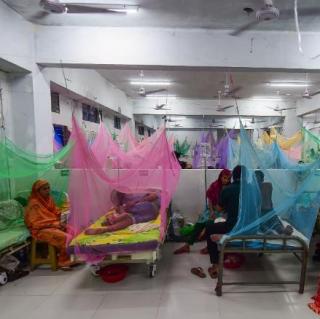
How climate crisis is accelerating the global spread of deadly dengue fever
2019-09-19 01'40''
主播: oasisst
8141 55
介绍:
Explosive outbreaks of dengue fever have rapidly spread in countries across Asia, killing more than 1,000 people, infecting hundreds of thousands and straining hospitals packed with sick families.
Images from Bangladesh show patients in teeming hospital wards, lying beneath mosquito nets under lurid electric strip lights.
Mothers cool their children from the sticky summer heat with hand-held fans while others rest on hospital floors, holding drips, waiting for a free bed.
This is the worst outbreak Bangladesh has ever seen. Five times as many people were infected in August than the whole of 2018, and so far this year 57 people have died.
Bangladeshi patients suffering from dengue fever receive treatment at the Shaheed Suhrawardy Medical College and Hospital in Dhaka on September 3, 2019.
It's a similar story across the region. Cambodia, Laos, Malaysia, Singapore, Sri Lanka, Thailand, and Vietnam have all reported higher than normal cases of the disease and deaths compared to last year. And the Philippines has declared a national dengue epidemic -- 1,107 people have died there since the start of the year and more than 250,000 have been infected.
Dengue is a seasonal, mosquito-borne disease commonly found in hot, wet regions of the tropics and subtropics during the rainy months.
Scientists say hotter, wetter weather brought on by climate change has created ideal conditions for female mosquitoes to lay their eggs. Not only are there more mosquitoes, but the rapid urbanization occurring in many Asian nations means that susceptible populations are living in closer contact with disease-carrying insects.
上一期: Johnson skips press conference to avoid anti-Brexit protests
下一期: Scientists show how to make airplane emissions less harmful
下一期: Scientists show how to make airplane emissions less harmful
大家还在听

